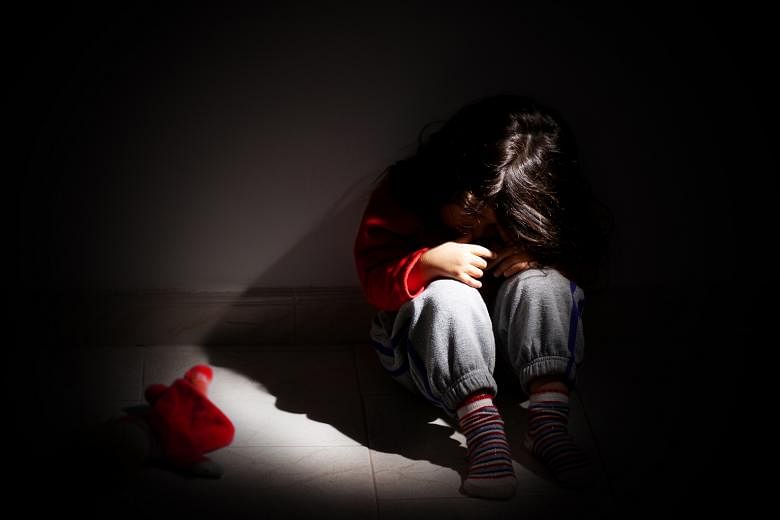Growing up in a violent household can have the same emotional impact on a child as a car crash or a natural disaster.
In fact, social workers from the Centre for Promoting Alternatives to Violence (Pave) found that children who had witnessed abuse - even though they were not hurt - showed symptoms of trauma.
"Some had flashbacks and nightmares or were triggered by reminders of the incident," said Ms Monica Zhang, a senior social worker who spoke on the topic at a Pave seminar last week.
"A car accident is a one-off event but violence at home could be chronic and children could experience even higher traumatic stress symptoms."
She and her team did a study on 102 children, aged between three and 18, who had received trauma- focused therapy over the past two years.
Half of this group had seen others being abused and had also been on the receiving end.
The bulk of the others had only witnessed violence but were traumatised enough to require therapy.
Not many people realise that this group of "invisible children" need as much help as those who have been abused, said Ms Zhang.
"Parents may not think that their children are affected, but children who are exposed to violence tend to have more depressive symptoms and score higher on the post- traumatic stress disorder scale."
While children in these circumstances may not be at immediate risk of harm, the abuse they witness may leave long-lasting scars.
-
551
Number of child abuse cases handled by the Ministry of Social and Family Development last year.
381
Number of child abuse cases in 2014.
Apart from depression, some of them develop problematic behaviours like aggression. They may learn to see violence as a solution to problems and grow up to perpetrate violence on their own children.
Last year, the Ministry of Social and Family Development handled 551 child abuse cases, up from 381 in 2014. These included both physical and sexual abuse, as well as instances of neglect.
The ministry launched a campaign this month to raise awareness of family violence and get people to flag such cases. Anyone who suspects that an individual is being abused should come forward.
-
Signs of child abuse
-
Child abuse does not always involve violence or anger. It can also be psychological or sexual, and it can include neglect.
Child abuse can have severe and long-lasting effects. The child may be affected physically, psychologically, behaviourally, or in all three ways. Here are some signs to look out for:
Physical abuse
•Injuries at various stages of healing and on different parts of the body at the same time
•Burns or fractures
•Aggressive or withdrawn behaviour
•The child is frightened of his parents or caregivers, tries to avoid contact with them and is afraid to go home
Psychological
•Aggressive, destructive or violent behaviour
•Low self-esteem and self-worth
•Depression
•Food gorging
Sexual
• Torn, stained or bloody underwear
•Bruises, bleeding or itching around the genital areas. Also, bruises on the thighs, breasts or buttocks.
•Inappropriate interest or knowledge of sexual matters. Talking, dressing or showing affection in ways that are not suitable for their age.
Neglect
• Constant hunger; begging for or stealing food
•Poor hygiene
•Constant fatigue; often falling asleep in class
WHERE TO GET HELP
If you suspect that a child is being abused, call the police or the Ministry of Social and Family Development's Child Protective Service helpline on 1800-777- 0000.
Children who are being abused can call the Tinkle Friend hotline on 1800-274-4788. They can also ask their school teacher, counsellor or other trusted adults for help.
Linette Lai
In a high-profile case in July, a woman and her boyfriend were sentenced to jail for abusing the woman's two-year-old son. He died after being slapped and kicked almost daily.
Abuse cases involving spouses and younger children below 16 form the bulk of Pave's clients.
Senior social worker Angeline Voon said that the centre has also seen 21 cases of violence towards an older child - 16 years and above - in the past two years.
She added that it is mainly fathers who abuse their daughters, often to assert authority over them.
One father with strong ideas on parenting, for example, felt that his daughter was not being a good parent to her own children. When she did not do what he wanted, he responded with anger and violence.
Ms Voon said: "When their position is threatened, parents may respond by trying to reassert their authority."
At last week's seminar, the Ministry of Social and Family Develop- ment's senior principal clinical and forensic psychologist Chu Chi Meng shared some of his observations on child abuse in Singapore.
For example, in one study of 440 cases, abuse generally tended to recur frequently in families where parenting methods involved excessive discipline.
And when there is a child with medical needs, abuse tended to recur more often in large households with several children, rather than smaller ones.
Dr Chu said: "It makes sense because a child with medical needs in a large household means an extra burden on the family."
Similarly, another study of 1,750 resolved abuse cases showed that children from larger families, as well as those who had unemployed mothers or a low household income, were more likely to be abused again, even though the problem had seemingly been rectified.
This data gives experts an idea of the dynamics within families, said Dr Chu, adding: "These could be the points at which to intervene more effectively."
Still, children from abusive backgrounds are not necessarily doomed to perpetuate the cycle of abuse when they grow older.
Ms Zhang said: "There are children who have experienced violence but don't turn out negative. They had supportive figures in their lives who were able to set healthy role models."


